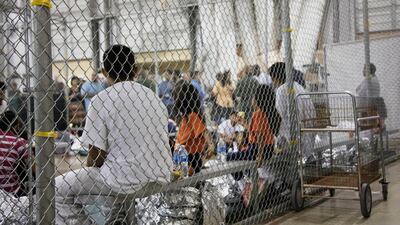The new administration of US President Joe Biden will pause some deportations for 100 days to ensure "fair and effective immigration enforcement" and focus on US-Mexico border security and the coronavirus pandemic, according to a Department of Homeland Security memo on Wednesday.
Mr Biden spent his first day in office repealing many of the executive actions that Mr Trump used to advance his agenda.
Mr Biden signed a memorandum directing the Department of Homeland Security and the US attorney general to preserve the Deferred Action for Childhood Arrivals programme, which protects migrants who came to the country as children from deportation, and reversed Mr Trump's executive order calling for stricter immigration enforcement away from the country's international borders.
The memorandum also calls for a 100-day moratorium on some deportations.
Providing a path to citizenship for millions of immigrants who are in the US illegally is part of Mr Biden's agenda, according to people briefed on his plans.
Ali Noorani, president of the National Immigration Forum and among those briefed, said immigrants would be put on an eight-year path.
Mr Biden issued 17 executive actions on his first day in office on Wednesday, which included fulfilling a pledge he made early in the campaign by revoking visa restrictions that Mr Trump put in place on 13 Muslim-majority countries.
The restrictions were described by Mr Trump as the “Muslim ban” and came in an executive order from the former president shortly after he took office in January 2017.
The ban was rewritten after legal challenges and its latest format was upheld by the Supreme Court in 2018.
But Mr Biden took executive action on Wednesday, ending “a policy rooted in religious animus and xenophobia", the White House said.


